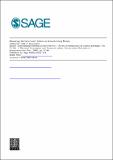| dc.description.abstract |
After identifying a lack of attention to electoral courts and post-electoral contestation of elections, this article seeks to compensate for the lack of comparative cross-national data on election dispute resolution by constructing ideal types of electoral court success and failure within one country, Mexico, where primary research has produced needed data. It exposes authoritarian incumbent/opposition bargaining over rules of Mexico’s democratic transition in the resolution of post-electoral conflicts in Mexico’s municipalities. In identifying legal versus extra-legal paths of post-electoral contestation, it conceives of a “rule of law” ratio-the ratio of extra-legal post-electoral conflicts to legal electoral court case filings—to indicate gradual increases in opposition party compliance with electoral institutions and compliance with them, the article concludes that this gap is attributable to conditions beyond their mere institutional configurations, such as social and political factors, and demonstrates that such compliance with institutions may not be assumed. |

